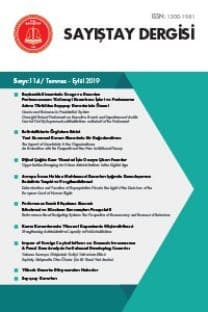Yerel Yönetimlerde Esnek Bütçe Kısıtı: Kavram, Ülke Deneyimleri ve Türkiye
Son yıllarda, kamu kesiminin sınırlandırılması ve bütçe kısıtının sıkılaştırılması, bütün dünyada bir mecburiyet haline gelmesine rağmen, ekonomik krizler ve devletin, sisteminin sosyoekonomik tutarlılığını sağlama zorunluluğu, esnek bütçe kısıtının ve buna bağlı sorunların yeniden tartışılmasına neden olmuştur. Bu çalışmada çeşitli ülkelerde ve Türkiye’de yerel yönetimlerde esnek bütçe kısıtının nedenleri, yol açtığı sorunlar ve çözüm yollarının incelenmesi amaçlanmaktadır. Esnek bütçe kısıtı, yerelin istenmeyen şekillerde merkezi mali kaynaklara ulaşmayı manipüle edebileceği bir durum olarak tanımlanabilir. Bu durumda, merkezi yönetimin ‘kurtarma yok’ beklentisi yaratma yetersizliği, esnek bütçe kısıtına neden olur. Bu sayede yerel yönetimler, yerel maliyetleri ve başarısızlığı merkezi mali kurtarmalar vasıtasıyla ulusal bütçe üzerine kaydırmak suretiyle kazanç sağlamaya yönelirler. Böylece diğerleri aleyhine yerel harcamalarda eşitsizlik ve aşırılık yaratırlar; sonuçta tüm ülkeye yayılan maliyetlere yol açarlar
Anahtar Kelimeler:
Esnek bütçe kısıtı, Mali kurtarma, Yerel yönetimler, Mali özerklik
SOFT BUDGET CONSTRAINT OF LOCAL GOVERNMENTS: DEFINITION, COUNTRY EXPERIENCES AND TURKEY
In recent years, although minimizing public sector and hardening of its budget constraint have become a necessity all over the world, economic crises and state’s obligation to provide the consistency of the socio-economic of the system have caused to discuss soft budget constraint and problems associated with it again. In this study, it is aimed to examine causes, related problems and solutions of soft budget constraint in various countries and Turkey. A soft budget constraint can be defined as the situation when a local government can manipulate its access to funds in undesirable ways. Hence, local governments turn towards to provide benefit by shifting their costs and failures onto the national budget through bailouts from central government. In this way, they create inequality and extremism over local spending against others, and finally lead to costs across the country
Keywords:
Soft budget constraint, Bailout, Local goverments, Fiscal autonomy,
___
- Aizenman, Joshua (1993), “Soft Budget Constraints, Taxes and the Incentive to Cooperate”, International Economie Review, Cilt 34, Sayı 4.
- Bird, Richard, Almos Tassonyi (2003), “Constraining Subnational Fiscal Behavior in Canada:Different Approaches, Similar Results?”, Fiscal Decentralization and the Challenge of Hard Budget Constraints, (der.) Jonathan Rodden, Gunnar Eskeland, Jennie Litvack, Cambridge: MIT Press.
- Bordignon, Massimo (2004), “Fiscal Decentralization: How to Harden The Budget Constraint”, http://ec.europa.eu/economy_finance/events/2004/bxl1104/ papers/bordignon_en.pdf, 01/10/2013.
- Grey, Barry (2013), “The Detroit Bankruptcy”, http://www.wsws.org/en/ articles/2013/07/20/pers-j20.html, 15/09/2013.
- Inman, Robert (2003), “Transfers and Bailouts: Enforcing Local Fiscal Discipline with Lessons from U.S. Federalism”, Fiscal Decentralization and the Challenge of Hard Budget Constraints, (der.) Jonathan Rodden, Gunnar Eskeland, Jennie Litvack, Cambridge: MIT Press.
- Jin, Jing, Heng-fu Zou (2003), “Soft-Budget Constraint on Local Governments in China”, Fiscal Decentralization and the Challenge of Hard Budget Constraints, (der.) Jonathan Rodden, Gunnar Eskeland, Jennie Litvack, Cambridge: MIT Press.
- Jones, Shannon (2013), “Detroit Bankruptcy Filing Paves The Way for Assault on Workers”, 01/10/2013.
- Kaya, Fatih (2009), Mali Kural Uygulamaları ve Türkiye İncelemesi, DPT Uzmanlık Tezleri, No: 2807.
- Kornai, Janos (1980), Economies of Shortage, North-Holland, Amsterdam.
- Kornai, Janos (1986), “The Soft Budget Constraint”, Kyklos, Sayı 39.
- Koyuncu, Emre (2012), Yenilenen Yerel Yönetim Sisteminde Belediye ve İl Özel İdarelerinin Genel Bütçe Vergi Gelirlerinden Alacakları Payların Karşılaştırmalı Analizi, TEPAV.
- Rodden, Jonathan (2003), “Soft Budget Constraints and German Federalism”, Fiscal Decentralization and the Challenge of Hard Budget Constraints, (der.) Jonathan Rodden, Gunnar Eskeland, Jennie Litvack, Cambridge: MIT Press.
- Sağbaş, İsa (2010), “Merkezden Yerel Yönetimlere Mali Transferlerde Yeni Döneme İlişkin Gözlemler”, Türkiye’de Yerel Yönetimlerin Sorunları ve Geleceği, (der.) Nihat Falay vd., Seçkin Yayıncılık, Ankara. Streissler, Erich W.,(1990), “What Kind of Economic Liberalism may We Expect in Eastern Europe?”, East European Politics and Societies, Cilt 5, Sayı 1.
- Ulusoy, Ahmet, Tekin Akdemir (2013), Mahalli İdareler, Seçkin Yayıncılık, Ankara.
- Vahabi, Mehrdad (2012), “Soft Budget Constraints and Predatory States”, Review of Radical Political Economics, Cilt 44, Sayı 4.
- Vigneault, Marianne (2005), “Intergovernmental Fiscal Relations and The Soft Budget Constraint Problem”, http://www.queensu.ca/iigr/WorkingPapers/ Archive/2005/2005-2Vigneault.pdf, 06/10/2013.
- Webb, Steven (2003), “Argentina: Hardening the Provincial Budget Constraint”, Fiscal Decentralization and the Challenge of Hard Budget Constraints, (der.) Jonathan Rodden, Gunnar Eskeland, Jennie Litvack, Cambridge: MIT Press.
- White, Jerry (2013), “The Collapse of Detroit: An Indictment of American Capitalism”, http://www.wsws.org/en/articles/2013/03/07/pers-m07.html, 15/09/2013.
- Yılmaz, Hakan, Ferhat Emil, Baki Kerimoğlu (2012), Yerel Yönetimler Maliyesi, Mali Hizmetler Derneği, Ankara.
- ISSN: 1300-1981
- Yayın Aralığı: Yılda 4 Sayı
- Başlangıç: 1990
- Yayıncı: T.C. Sayıştay Başkanlığı
Sayıdaki Diğer Makaleler
Denetimin İlişkili Olduğu Disiplinler Üzerine Bir Değerlendirme
Tıbbi Atık Yönetiminin Ekonomisi
Cari Açık Ekonomi Üzerindeki Finansal Baskıyı Artırıyor mu?
“Etik Denetim” Konulu EUROSAI Etik Denetim Çalışma Grubu Toplantısı
Ombudsmanlık Kavramı ve Türkiye’de Kamu Denetçiliği Kurumundan Beklentiler
Yüksek Denetim Kurumları Performans Değerlendirme Çerçevesi SAI PMF
Yerel Yönetimlerde Esnek Bütçe Kısıtı: Kavram, Ülke Deneyimleri ve Türkiye
